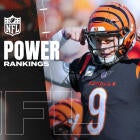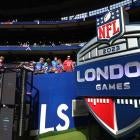
Last offseason, the new regime in charge of making decisions for the Las Vegas Raiders had a tough choice to make. They had until late April to decide whether or not to pick up the fifth-year options on the contracts of 2019 first-round picks Clelin Ferrell, Johnathan Abram, and Josh Jacobs.
The first two were obvious; there was no way the Raiders were going to pay Ferrell $11.5 million nor Abram $8.034 million for the 2023 season. The fifth-year option decision on Jacobs was slightly (yes, only slightly) more complicated. A salary of $8 million or so for a running back is on the high side, but you can live with it if it's only for one year -- so long as the player proves himself worthy of such a contract, of course.
Jacobs had flashed talent during his first three seasons in the NFL, but he was also a mainstay on the injury report and had seemed to take a significant step backward in his second and third seasons following a promising rookie year. After rushing for 1,150 yards and seven touchdowns while averaging 4.8 yards per carry as a rookie, Jacobs totaled 1,937 yards and 21 scores through his next two seasons, but did so while averaging just 4.0 yards a pop. His passing-game contributions were muted, and despite his gaudy touchdown totals, he ranked among the least efficient high-volume backs in the league.
So, Josh McDaniels and Dave Ziegler decided not to pick up the fifth-year option on Jacobs' contract, deciding instead to take the approximately $3.8 million cap hit for the 2022 season and then see what happens. Well, what has happened is that Jacobs has put together the best season of his career, and one of the best running-back seasons leaguewide (Jacobs and the Raiders face the Steelers on Saturday at 8:15 p.m. ET on NFL Network, stream it on FuboTV).
Through Week 15, he leads the NFL in touches (a career-high 337), as well as rushing yards (a career-high 1,495) and yards from scrimmage (a career-high 1,858). His 5.1 yards per carry mark is a new career best, as is his 6.6 receiving yards per target. He's been much more of a three-down contributor than ever before, playing 75% of the Raiders' offensive snaps this season. His career-high prior to this year was just 63%.
Jacobs' six 100-yard rushing games this season are second-most in the league behind only Derrick Henry's seven; and he joined Henry, Dalvin Cook, Jonathan Taylor, and Leonard Fournette as the only active players to rush for 200-plus yards in a game. The 303 yards from scrimmage he recorded in that overtime win against the Seahawks (which included a game-winning, 86-yard romp in overtime) were the fourth-most in a single game since 2000.
With Jacobs blowing up this season and headed into free agency next March, it's worth taking a deeper look at his season to see where he has improved, which areas of improvement are most and least sustainable, and what it all might mean for his future contract prospects.
Where Jacobs has improved
Let's start with where Jacobs has improved. He's been both more consistent (his success rate is a career-high 46.2%, according to Tru Media) and more explosive (10.3% of his carries have created explosive gains) than ever before. That's a potent combination. He's been able to pull off that dual feat because he's averaging career highs in yards both before and after contact per carry this season. That's allowed him to avoid negative runs (career-low 13.4% of rushes have been stopped at or behind the line of scrimmage) while keeping the chains moving (42.2% of carries have gained 5 yards or more). He's also kept his broken tackle rate around where it was in his first and third seasons, rather than the dreadful mark he posted in Year 2 of his career.
| Year | Success % | YBCo/Att | YCo/Att | Gun YPC | % 8-Box | % Neg | % 5+ Yds | % Expl | Avoid % |
|---|---|---|---|---|---|---|---|---|---|
| 2019 | 40.5% | 1.27 | 3.48 | 3.7 | 19.8% | 15.3% | 34.1% | 9.1% | 32.6% |
| 2020 | 38.8% | 1.08 | 2.82 | 4.4 | 25.0% | 19.8% | 33.7% | 8.8% | 22.7% |
| 2021 | 40.6% | 1.18 | 2.84 | 2.9 | 17.5% | 15.7% | 36.4% | 6.0% | 33.2% |
| 2022 | 46.2% | 1.53 | 3.61 | 5.0 | 18.9% | 13.4% | 42.3% | 10.3% | 31.6% |
The Raiders have put his skills to their best use on draw plays, and done so more often than any other team. According to Tru Media, Jacobs has more than twice as many carries on run plays categorized as a draw (when the quarterback acts like he's going to pass to get the rushers up the field, then hands it off up the middle) than the next-closest player. Jacobs has 33 such carries for 175 yards, while Rhamondre Stevenson has 16 totes for 87 yards on those plays.
He's showcased a wonderful combination of patience and decisiveness in his running style this season. NFL.com's NextGen Stats pegs him as the league's second-most north-south runner this year behind only Khalil Herbert (he ranked 39th out of 52 qualifiers in the same stat last season), but he's also spent about a tenth of a second more behind the line of scrimmage on his average carry this year than last. In other words, he's waiting the extra beat for a hole to open up, then hitting the jets and bursting through.
He's also done a far better job of pressing the hole until a crease opens up, then cutting back into the correct lane. He's done that on both inside and out runs, and he's spotted cutbacks up the middle or all the way back across the formation.
When it all comes together on one play, it can look pretty wild. His jaunt against Denver earlier this season where he pressed the hole to the right, cut all the way back behind three offensive linemen, made a jump-cut, made three defenders miss in the hole, then broke a tackle a few yards downfield and sped away from a safety to tip off a huge gain was a thing of beauty.
Yards after contact and tackle-avoidance are generally things under a running back's control. The ability to create explosive plays usually is, as well. But yards before contact, the lack of negative runs, and even the share of runs that gain 5-plus yards can just as often be attributed to offensive line play and scheme. In other words, it's a combination of skill and circumstance that has led to Jacobs' monster season.
The tough part about figuring out what is and isn't sticky from this year's performance is that he had been trending in the opposite direction in so many of these areas. He had been creating fewer and fewer explosive gains and gaining fewer yards after contact with each passing season, for example.
What to expect from Jacobs in the coming seasons
So, is this the new normal, or should we expect a reversion to where he has been going in prior seasons? Annoyingly, but predictably, the answer is likely somewhere in between. We shouldn't expect this year's version of Jacobs to suddenly be what he is for the next several years. We have a much larger sample of him not being this type of player than we do of him producing at this level.
But we also maybe shouldn't underestimate the ceiling on his production anymore. It didn't seem like he had this type of season in him, but clearly he does. So, the potential for future payoff over the next few years is there, if everything comes together the way it has for him this year. What does that mean for his future in free agency? Honestly, I am not sure. Someone is probably going to pay him. You don't have this type of season and then not get a big-money contract. General managers, for the most part, can't help themselves, even if plenty of them know it's not a smart idea to give a long-term deal to a running back. (Yes, even one who will be 25 years old next season and is coming off the type of year Jacobs has had.)
As for how big that contract will be, it's tough to say. In all likelihood, any team giving him (for example) a four- or five-year deal is going to regret at least the last couple years of that pact -- especially if it carries an average annual value in the double-digits of millions of dollars per year. (He could potentially provide enough value over the next few seasons to justify the investment on the front end, but even that is uncertain given how his career had gone prior to this season.) There are currently eight backs with contracts that have average annual values in excess of $10 million, but I'd say at least four of those teams would like to get out of said contracts as soon as possible, and the number figures to climb very soon. That might give teams pause about handing out a similar contract, especially to a player who is not already on their roster.
It doesn't help Jacobs that this year's free-agency class is kind of stacked at running back: Saquon Barkley, Tony Pollard, David Montgomery, Miles Sanders, Raheem Mostert and Jeff Wilson, Jerick McKinnon, Kareem Hunt, Jamaal Williams, Samaje Perine, Alexander Mattison, Rashaad Penny, Devin Singletary, D'Ernest Johnson... all of these guys could hit the market this offseason. The most realistic option might actually be the franchise tag, which would pay him a lot of money, but for only one year. It wouldn't be a particularly good deal for Jacobs, and given his history, it might not even be a good one for the Raiders. But it also might be the most likely result after the way this season has gone.






















